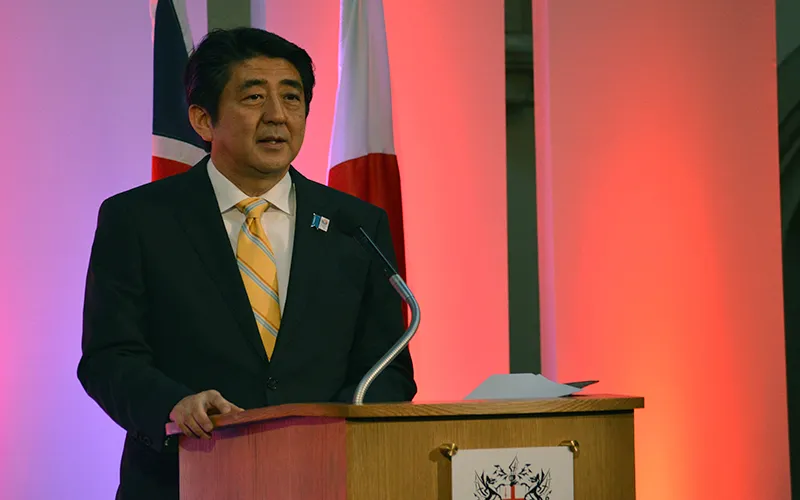-
CENTRES
Progammes & Centres
Location
The quad -- India, Australia, Japan, and the United States -- should take care to prevent the possible dangers in China's rise from becoming a self-fulfilling prophecy. It should use the wide menu of options for quadrilateral cooperation to bargain for diplomatic resolution of China's disputes with its neighbours.

When Japanese Prime Minister Shinzo Abe addressed the Indian Parliament in 2007, it was the ripe time to turn the idea of 'quadrilateral dialogue' into reality. Mr Abe stressed the ideals of peace, stability, freedom of navigation, shared by India, Australia, Japan, and the United States. But the possibility of quadrilateral cooperation was short-lived; Australian Foreign Minister Stephen Smith referred to the quad as a 'one-time affair' while then Prime Minister Manmohan Singh said it "never got going."
Beneath these dismissive remarks lies the importance of jeopardising ties with China. While China professed its commitment to a 'peaceful rise,' souring relations by provoking Chinese fears of 'encirclement' seemed unnecessary and detrimental. Yet, eight years later, the newly assertive Chinese behaviour has prompted the four democracies to question whether passivity will bring about a stable Asia-Pacific.
Reports of the quad's demise were premature; today, enhanced cooperation between the four countries is on the minds of Prime Ministers Narendra Modi, Tony Abbott, Shinzo Abe and President Barack Obama. Though such cooperation can take many forms, China remains central to the quad.
Quadrilateral partnership should succeed this year where it failed in 2007 because its advantages are increasingly necessary and its disadvantages are reduced. The intervening eight years have shown that the risks to Indo-Pacific stability created by China's rise will not go away on their own, but will instead, require sustained diplomatic engagement by powers that China respects.
The quad should take care to prevent the possible dangers in China's rise from becoming a self-fulfilling prophecy. It should use the wide menu of options for quadrilateral cooperation - from simple meetings to joint defence exercises - to bargain for diplomatic resolution of China's disputes with its neighbours. In this way, the quad and China can avert simmering potential for conflict in the Indo-Pacific, ensuring the conditions for China's peaceful rise.
Prime Minister Modi's India is now establishing bilateral and trilateral partnerships with Asian countries and the United States. Tony Abbott's Australia has broken with the policies of the Rudd and Howard Governments by pursuing nuclear cooperation with India. While in 2007, Mr Kevin Rudd withdrew from the quad to protect Australian trade with China, today China's demand for Australian commodities is decreasing.
Mr Abe, the progenitor of the quad concept, has re-interpreted the constitution to allow Japan to defend its allies and participated in the India-US Malabar Naval Exercises. The United States pivoted to Asia by reaffirming its alliances with Japan and Australia and conducting two successful visits between Mr Obama and Mr Modi.
The presence of US President as the chief guest at India's Republic Day - a position filled by Mr Abe the previous year, interspersed with a visit by Mr Abbott in between - indicates growing warmth that is smoothening old differences and already connecting each of these countries bilaterally and trilaterally.
At the same time, China's assertiveness across the McMahon Line with India and into disputed claims in the South and East China Seas has grown. Himalayan border incursions, offensively projected Coast Guard and fishing ships in the South China Sea, and the unilateral declaration of an Air Defence Identification Zone over the disputed Senkaku/Diaoyu Islands in the East China Sea all fall far below the threshold for war. Still, they are above the threshold expected of a country peacefully rising.
China's desire to solve each of its disputes bilaterally allows it to take advantage of the power differential with weaker countries, particularly in the South China Sea. This attempt to re-define borders outside of multi-lateral legal mechanisms like the United Nations Convention on the Law of the Sea and the International Court of Justice, compels a coordinated rather than piecemeal response.
All four countries of the quad, along with China, have an interest in the peaceful resolution of the Indian, Japanese, and South China Sea disputes. Together they can ensure their own sovereignty, the freedom of navigation, and a stable Indo-Pacific with fewer flash points between the nationalistic countries.
Only the leverage of a concert of countries powerful enough to change the status quo of unequal bilateral relations, can alter the current dynamic. Yet, this power should as far as possible be expressed through diplomacy and dialogue, rather than the harder signalling of alliances or quadrilateral defence partnership. The quad should be motivated by common interests in resolving issues. If China continues to determine these issues through changing facts on the ground, it will contribute to a narrative of being an aggressor.
The quad should be formed as a body for diplomatic solutions, working to end Asia's flashpoints for conflict while keeping joint defence cooperation - like permanent accession of Japan and Australia to Exercise Malabar - in the reserve.
Too strong a declaration of mutual defence interests would be counterproductive; all leaders should be wary of the way overtly 'choosing sides' can create self-fulfilling prophecies of conflict. But as the world determines whether the coming multi-polar system will be dominated by coercion and asymmetry or negotiation and law, the quad has a constructive role to play.
(Will Poff-Webster is a visiting Henry Luce Fellow at Observer Research Foundation, Delhi. Vindu Mai Chotani is a Research Assistant at Observer Research Foundation)
Courtesy: Pioneer
The views expressed above belong to the author(s). ORF research and analyses now available on Telegram! Click here to access our curated content — blogs, longforms and interviews.